
The evening was warm and pleasant with just enough wind to keep the sails filled; autumn dusk had begun to obscure the distance. Yachts that had ventured up the narrowing Humber river as far as they dared before the tide turned, were hurrying back to the safety of their moorings in a creek off the broad river.
At low tide the river outside these moorings became draining mud flats, shifting sand banks, and a much-reduced river that had sometimes been waded. Further upriver, seagulls had revealed a barely hidden hill of mud, by paddling on it! In another 15 minutes or so the bank would be exposed, and there was little time to waste for boats heading downriver.
I was the owner of a 23ft sailing cruiser and had been justifying my decision to head back to our berth. My wife, Lisa, maintained that there would be time to sail on and still return safely. I had learned the hard way, what it meant to be grounded, helpless on a mud bank.
Shortcut
Returning on the new tide from the mouth of the miles-wide estuary of the Humber, I wondered why I had to follow the dredged and buoyed channel that large ships used. Surely, with my yacht's much shallower draught, I could cut the corner of the wide curve in the river and save time? It looked safe enough, with no disturbed water or other clues to danger, and yachts were sailing on the opposite side, so I didn't bother to consult the chart.
Things went well until the boat suddenly stopped, and then lay over on one side with her keel stuck firmly in the mud. The unmarked spit had claimed another careless yachtsman!
Lisa began to worry so I explained that we'd gone aground on a low but flooding tide. The water would speed up and deepen as it reached mid-tide, and would continue to deepen until it reached high water. However, if we came off at high water the tide would change direction, and push us back down the estuary.
This story is from the {{IssueName}} edition of {{MagazineName}}.
Start your 7-day Magzter GOLD free trial to access thousands of curated premium stories, and 9,000+ magazines and newspapers.
Already a subscriber ? Sign In
This story is from the {{IssueName}} edition of {{MagazineName}}.
Start your 7-day Magzter GOLD free trial to access thousands of curated premium stories, and 9,000+ magazines and newspapers.
Already a subscriber? Sign In

Orca sink yacht in Strait of Gibraltar
Spain's maritime rescue service, Salvamento Maritimo, has reported that a 15m (49ft) yacht sank in Moroccan waters in the Strait of Gibraltar following interaction with a pod of orca.

No kill cord or lifejackets were worn during fatal powerboat crash
A kill cord and lifejacket are useless unless worn-that's the warning from the Marine Accident Investigation Branch (MAIB), following its investigation into a powerboat crash that killed a 32-year-old woman and five-year-old girl on 2 October 2022.

Multihull sail work
Brush up on multihull sailing skills before heading off on charter with Gavin Le Sueur's guide to spinnaker handling, tacking and gybing

Five top causes of engine failure and how to prevent them
Jake Kavanagh talks to Sea Start marine engineer Nick Eales about how to avoid the five major causes of an engine breakdown at sea
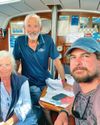
Sail the Atlantic with strangers
Would you sail across the Atlantic with someone you've just met? Ali Wood meets the cruising crews who've done just that

IZIBoat: simple sailing
Rupert Holmes sails an innovative catamaran design intended to widen participation in sailing among those with little time to get on the water in more conventional craft
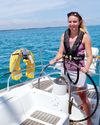
30 WAYS TO GET AFLOAT
From tall ships to small dinghies, you needn't own a boat to sail. Ali Wood looks at the options, and how skippers can also find crew
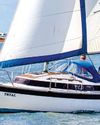
Boats for restoring under £20,000
Duncan Kent picks the best sub-35ft sail and power boats to look for when aiming to undertake a restoration on a budget
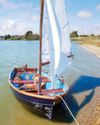
Seaworthy dinghies for less than £500
For low cost traditionally-styled GRP trailer-sailers, consider the Foreland and the Otter available at bargain basement prices
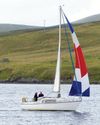
Playing with coloured sails
Maintaining an hourglass-shaped balloon and ratcheting up the log numbers